The nine individuals who make up Portland City Council are usually in agreement as a voting body, but split votes illustrate the nuanced differences between them. To better understand these differences, the Portland Townsman has cataloged every split decision that occurred in the past six months of Council meetings.
Before detailing each vote, using a handy mathematical algorithm, we can visualize how similarly the councilors have voted to one another:
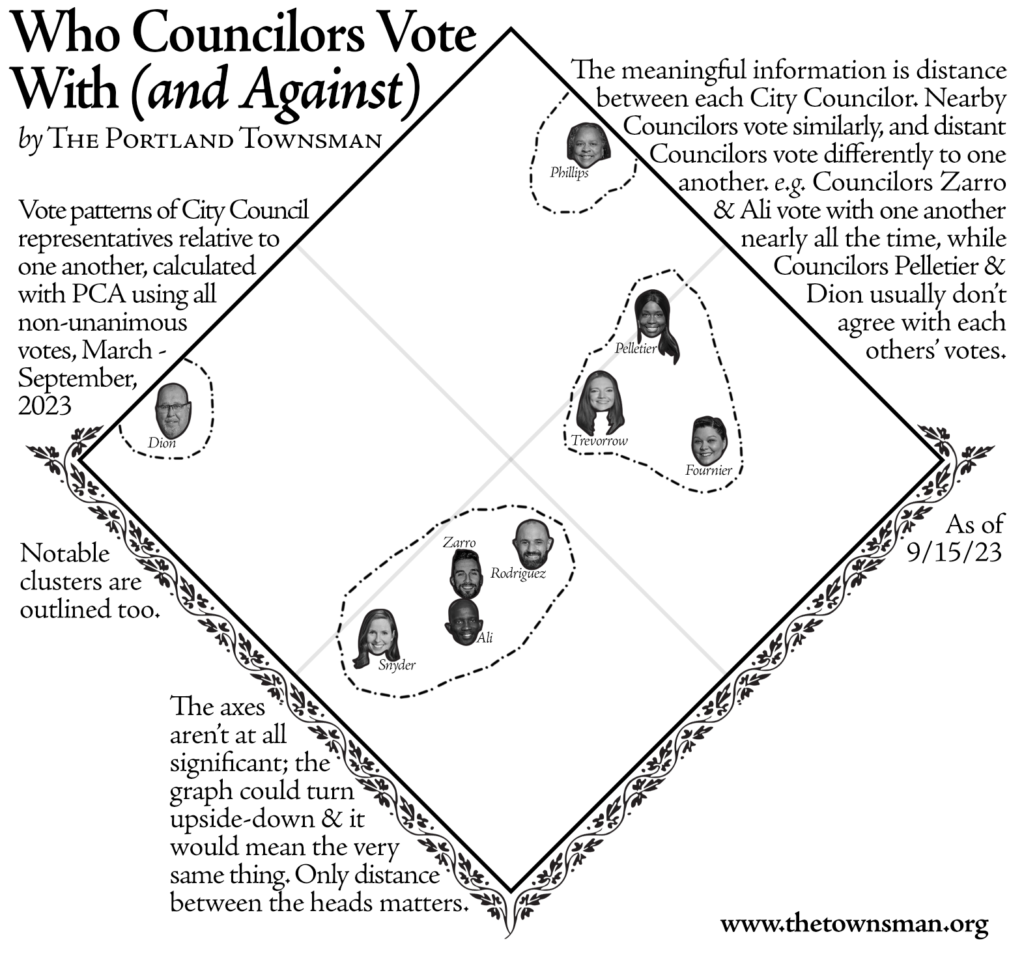
Friend of the Townsman and data analyst Todd Morse assisted in the creation of this tool, and describes it as follows –
This graph shows how closely to each other our city councilors vote. It was made by putting their voting records from the last six months into an algorithm called “PCA.” PCA combines all of the votes on a voting record into two coordinates on the graph, giving more weight to the votes that set councilors apart. The distances between the points represent how differently councilors voted from each other.
But what are these votes which contributed to this plot?
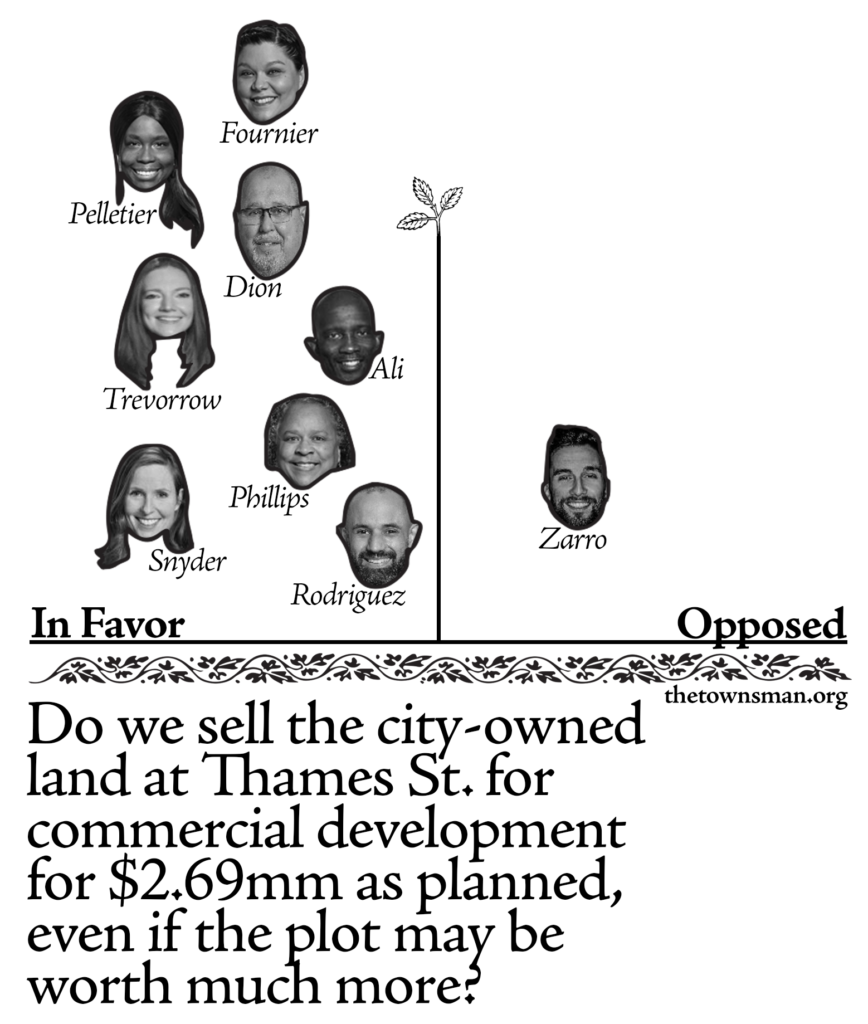
At the March 6th meeting, the sale of a parcel of city land for commercial development prompted skepticism from Councilor Zarro, who believed that the land was being sold too cheaply. A 2021 estimate appraised the land at $3.9 to $4.1 million, but the city was selling it for only $2.69 million, and of that sum, only $1.15 million was cash (the rest being in-kind assets and services.) Zarro also opposed the sale on the grounds that it was not being used for housing, despite this being an urgent priority of the council. The only other councilor to chime in on this discussion was Dion, who was in favor of the sale out of respect for the process. Ultimately, Zarro stood alone with his opposing vote.
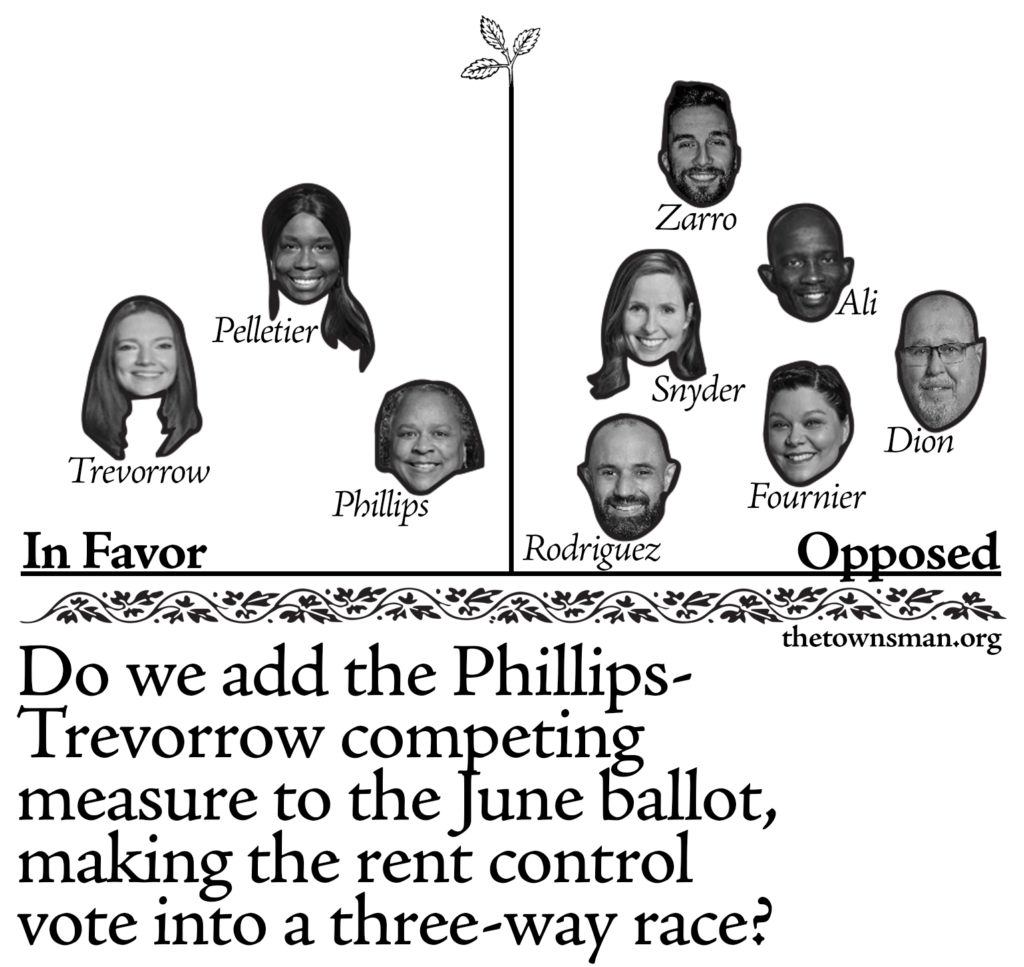
On March 20th, the Council was faced with the decision of whether to add a citizen-initiated referendum to the June ballot. The referendum in question would modify the current rent control ordinance in Portland to allow for uncapped rent increases following voluntary departure by the prior tenant. Per city code, the council has three options in this situation: add the referendum to the ballot; implement the referendum immediately; or, propose an additional, Council-sponsored option on the ballot. Councilor Phillips, with the support of Councilor Trevorrow, opted for the latter.
Phillips, Trevorrow, and Councilor Pelletier voted in support of adding the competing measure to the ballot, believing it to be a fair third option on a hotly contested issue. The opposing votes – Fournier, Rodriguez, Dion, Ali, Zarro, and Snyder – opposed the measure largely because there had not been enough time to consider the contents of the amendment before the vote. The competing measure thus failed in council, leaving voters with only two options on the ballot.
The referendum was ultimately unsuccessful in the June election.
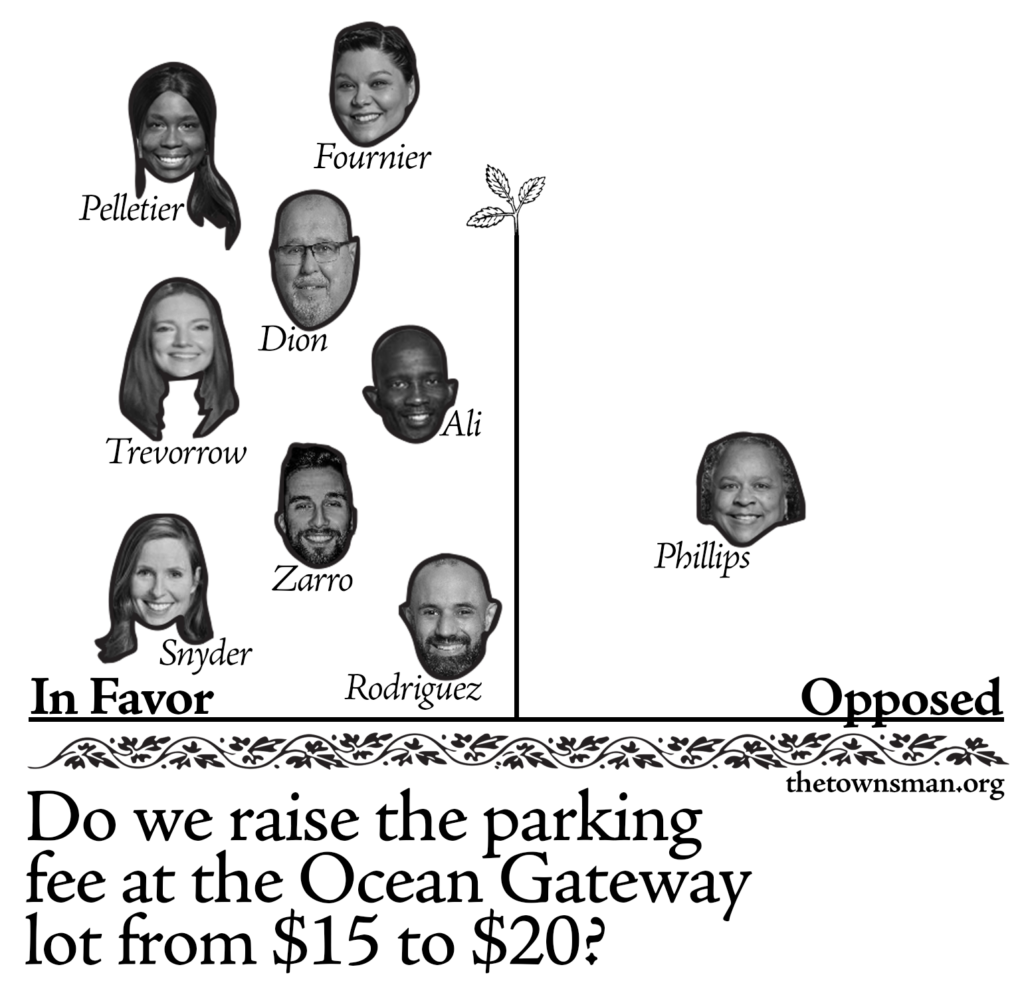
This order, presented to the Council on April 10th, would raise the daily parking fee at the Ocean Gateway lot from $15 to $20. The lot is mostly used by island residents. The impetus for this change, according to City Manager West, was to bring in more revenue for the city’s transportation budget. Phillips staked her opposition to the fee hike, believing it was unfair to people who regularly use the lot, especially given that they had not had any advance notice. She was the sole opposing vote on the matter.
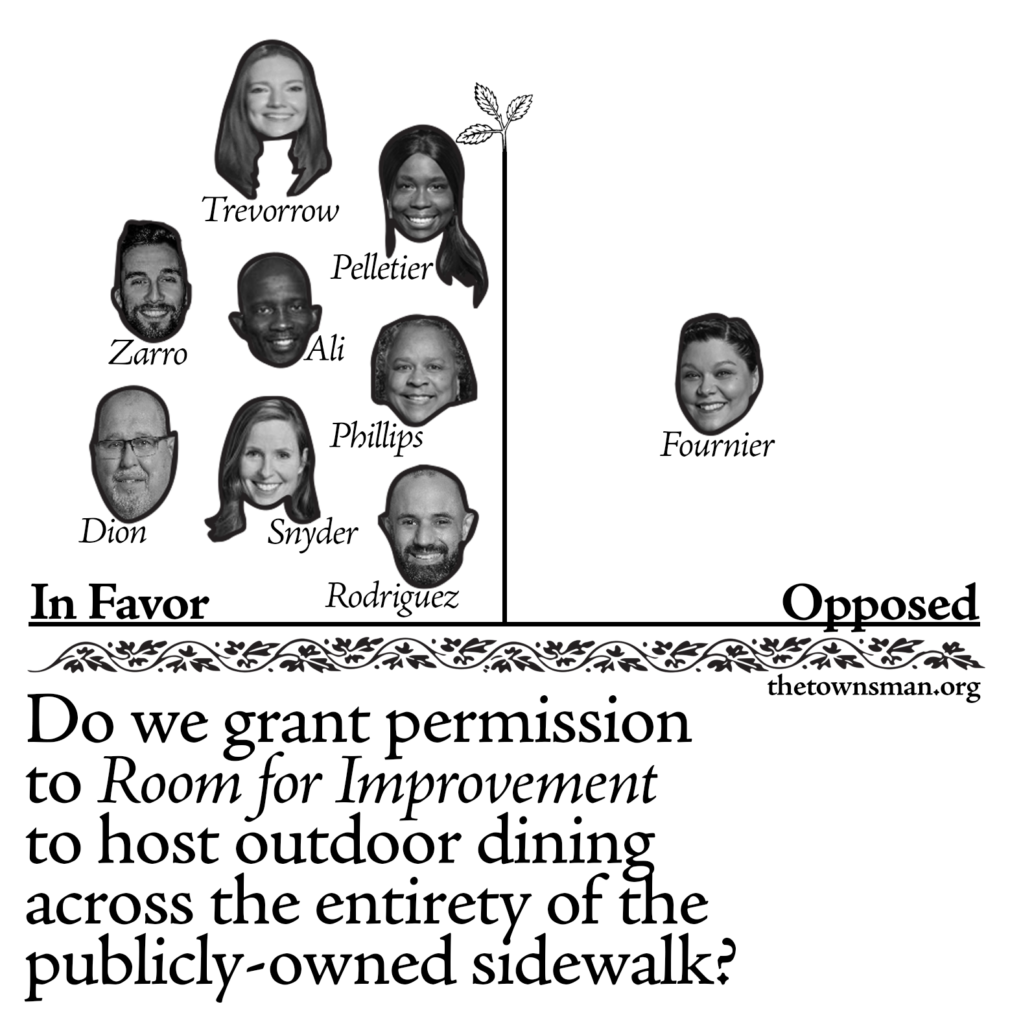
Councilor Fournier voted against this outdoor dining license on the grounds of accessibility. Allowing Room for Improvement to use the entire sidewalk would hinder mobility for pedestrians, especially because the road – Wharf Street – is cobblestone, she argued. Fournier was the only Councilor to vote against the license.

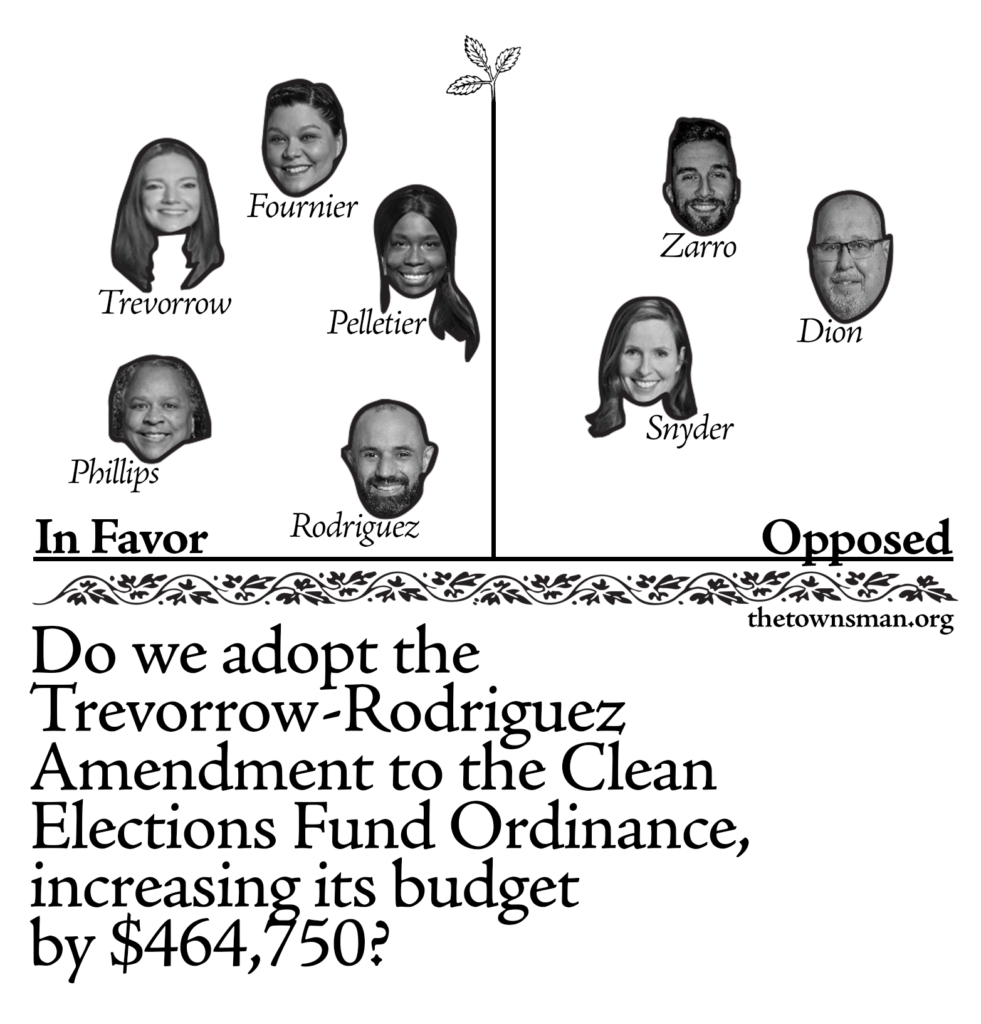
Councilors were divided on how to implement the voter-approved Clean Elections Fund, and specifically, how much money should be in the fund. Councilor Dion proposed that specific dollar amounts need not be determined in the ordinance, and should instead be determined as part of the annual budget process. While Mayor Snyder supported the amendment, no other councilors did. Those opposing the amendment voiced concerns that the Clean Election Fund needed to be fully functional – and thus fully funded – in its first year in order for the idea to catch on, and that designating a dollar amount as soon as possible was the only way to ensure the funds success. Dion’s amendment failed.
The second proposed path forward – authored by Trevorrow and Rodriguez – allocated a sum of $464,750 to the fund, almost double what was proposed in the original ordinance. The higher figure was determined, according to the two councilors, by reviewing historical campaign fundraising data. Councilors voting for this amendment – Trevorrow, Rodriguez, Pelletier, Phillips, and Fournier – followed the same logic as the earlier vote: a well-endowed fund would ensure the success of the Clean Elections project. Those opposed to this amendment – Dion, Snyder, and Zarro – primarily did so due to the high cost and the burden it would put on taxpayers. The Trevorrow-Rodriguez amendment passed.
Councilor Ali was not present for these votes.

The vote on the Riverton shelter was the only agenda item at this emergency meeting. The proposed shelter would specifically house asylum seekers. The majority of councilors saw the emergency need to house this population and supported the new shelter, but Dion opposed on the grounds that Riverton residents had very little involvement in this process. The emergency meeting was called with little publicity or advance notice, leaving many Rivertonians feeling disenfranchised, as expressed during public comment. Dion, being the representative for the Riverton neighborhood, voted in line with these sentiments. Ultimately the order passed with Dion’s vote being the only opposition.
Councilor Fournier and Councilor Dion were not present, and therefore did not vote, at this meeting.
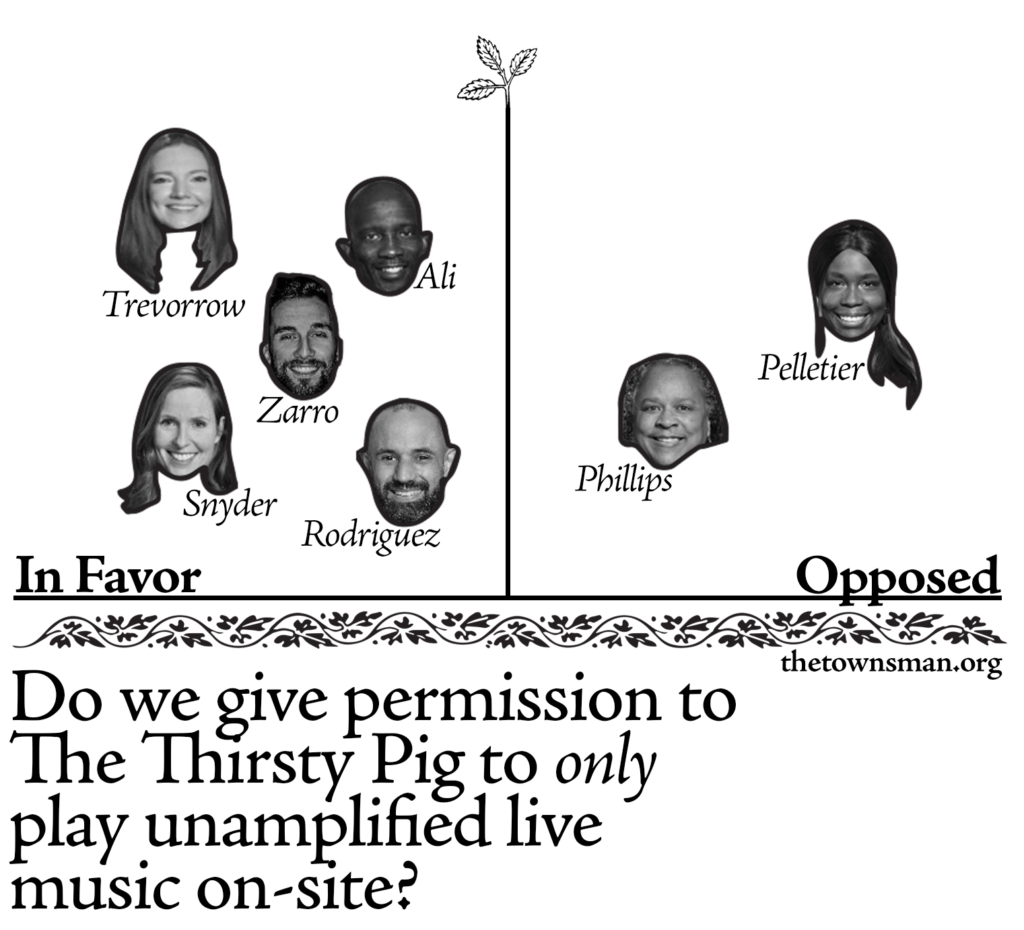
A business license for The Thirsty Pig caused a considerable stir at the June 26th meeting. During public comment, two opposing groups emerged – Thirsty Pig ownership, who were requesting approval from the city to host outdoor live music, and nearby residents, who had been disturbed by noise from the Thirsty Pig in the past. In an attempt to mediate the conflict between these groups, Trevorrow suggested that the establishments business license be conditioned to include only acoustic outdoor music. Snyder, Ali, Rodriguez and Zarro supported Trevorrow’s amendment, but Phillips and Pelletier opposed it, voicing that the sound mitigation plan that the bar had put forth in its license application should be sufficient. Trevorrow’s amendment passed.
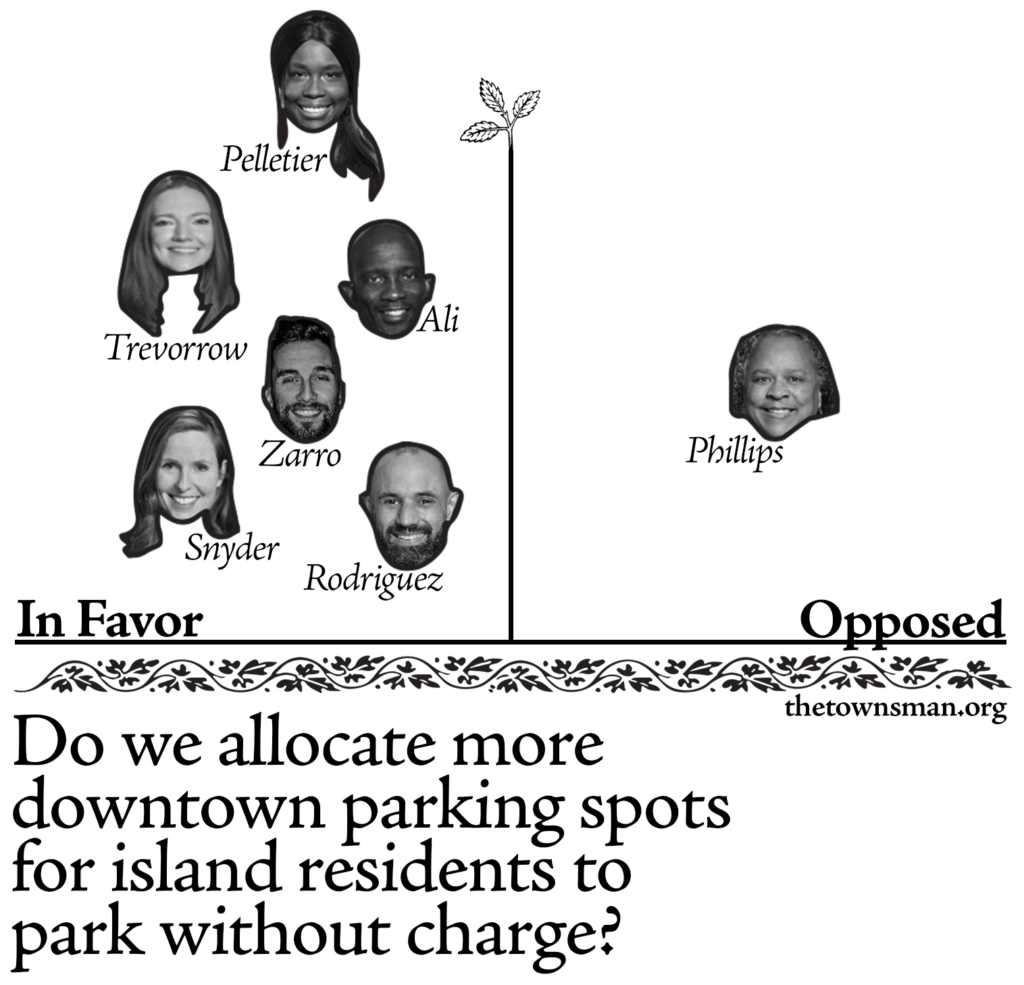
This order, the second split decision of the evening, would allocate more downtown parking spots for island residents. Both Phillips and Zarro expressed some skepticism at adding more of these spots – the city would lose parking revenue, and there are already 123 on-street spots with the island resident designation. Councilor Trevorrow, supporting the order, likened the island resident designation to any other neighborhood resident parking permit. Most councilors seemed to agree with Trevorrow; Snyder, Ali, Rodriguez, Trevorrow and Zarro – after a moment of hesitation – voted for its passage; Phillips remained opposed.
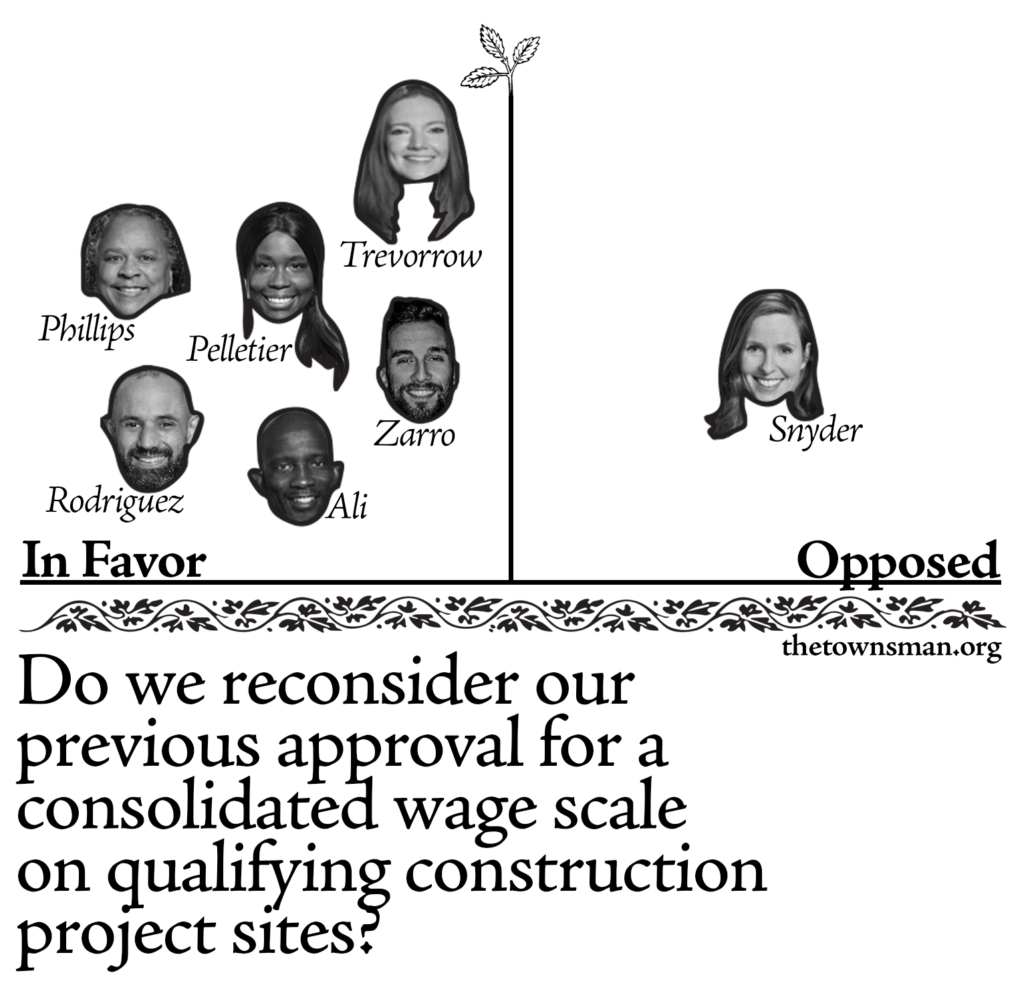
The wage scale in question, a consolidation of overlapping construction labor requirements by different funding sources, had been approved at an earlier Council meeting, but new information was conveyed to councilors following the orders’ passage that prompted Trevorrow to bring the order back to the Council floor. This time, the order would rescind the unanimous approval from the prior meeting and allow the Council to bring the matter to vote anew once the body is prepared to do so. Snyder opposed the order, believing that the prior vote should be sufficient to resolve the matter, but all other councilors present voted to reconsider.
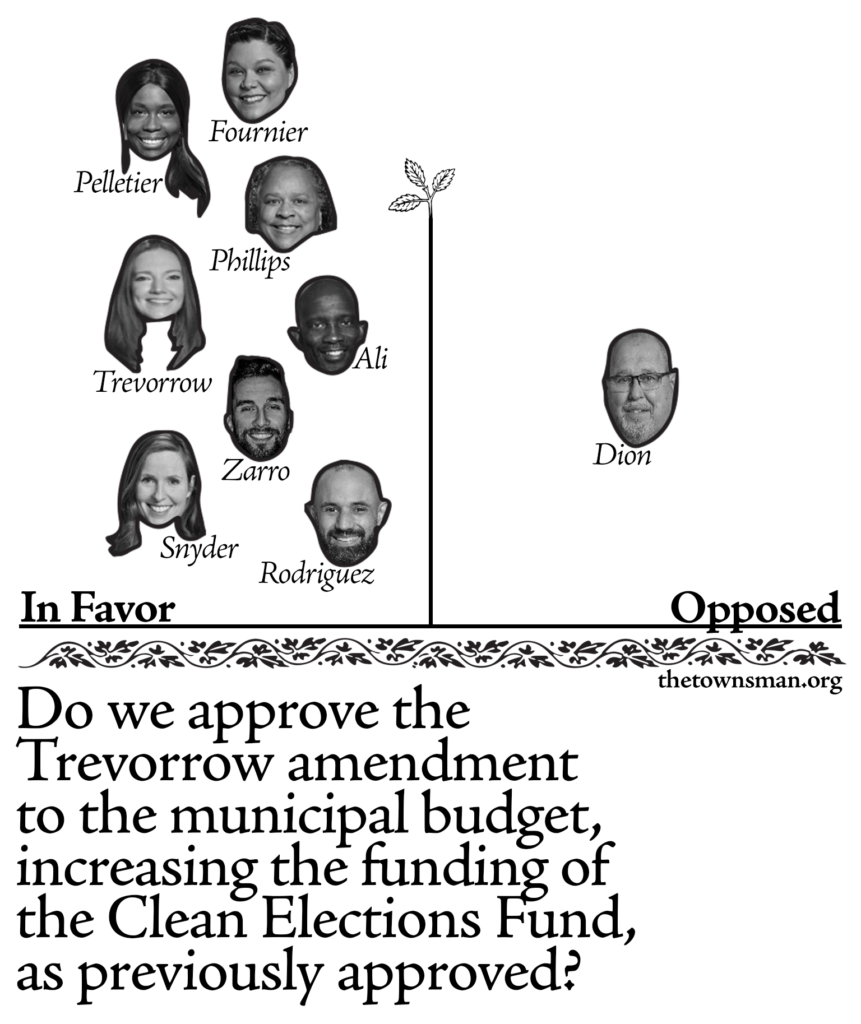
The municipal budget vote took place at the July 17th meeting. Councilor Trevorrow sponsored this request for $464,750 in the budget for the Clean Elections Fund. This matter had already been debated and voted on at the May 1st meeting – this action merely formally amended the municipal budget to fund it. Councilor Dion had voted against this measure on May 1st, alongside Snyder and Zarro. Dion stuck with his no vote at this meeting, while all other councilors voted in favor.

Rodriguez’s budget amendment, which conferred additional money to the executive department, met opposition from Councilor Phillips. She suggested that money should be diverted from elsewhere to cover the costs, but ultimately the amendment passed 8-1 with only Phillips opposing.
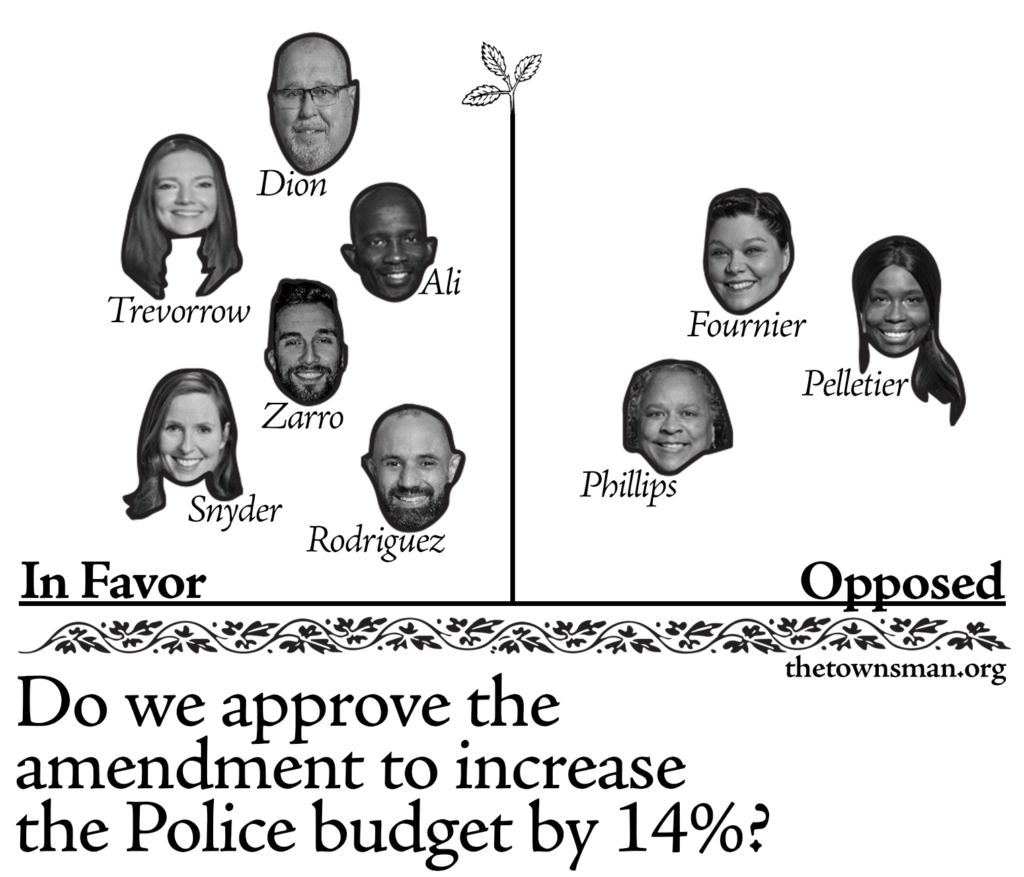
A proposed 14% increase in funding for the Portland Police prompted heated debate from councilors. Phillips was uncomfortable giving so much support to the police department after the events of April 1st, when a neo-nazi demonstration led to accusations of police mishandling. She proposed giving half the increase now, and half the increase in a year, after the police demonstrate that they are addressing issues of racial bias in the department. Fournier supported Phillips’ suggestion; Pelletier chimed in to add that increasing the police budget would not make the city any safer or less racist.
Proponents of this measure believed that the budget boost would improve the performance of the police department by allowing them to hire more officers at market rate. Dion was the most vocal advocate of the increase, with Snyder and Rodriguez voicing agreement.
The order passed 6-3; Trevorrow, Zarro, Snyder, Dion, Ali, Rodriguez voted for its passage, while Phillips, Fournier, and Pelletier opposed.
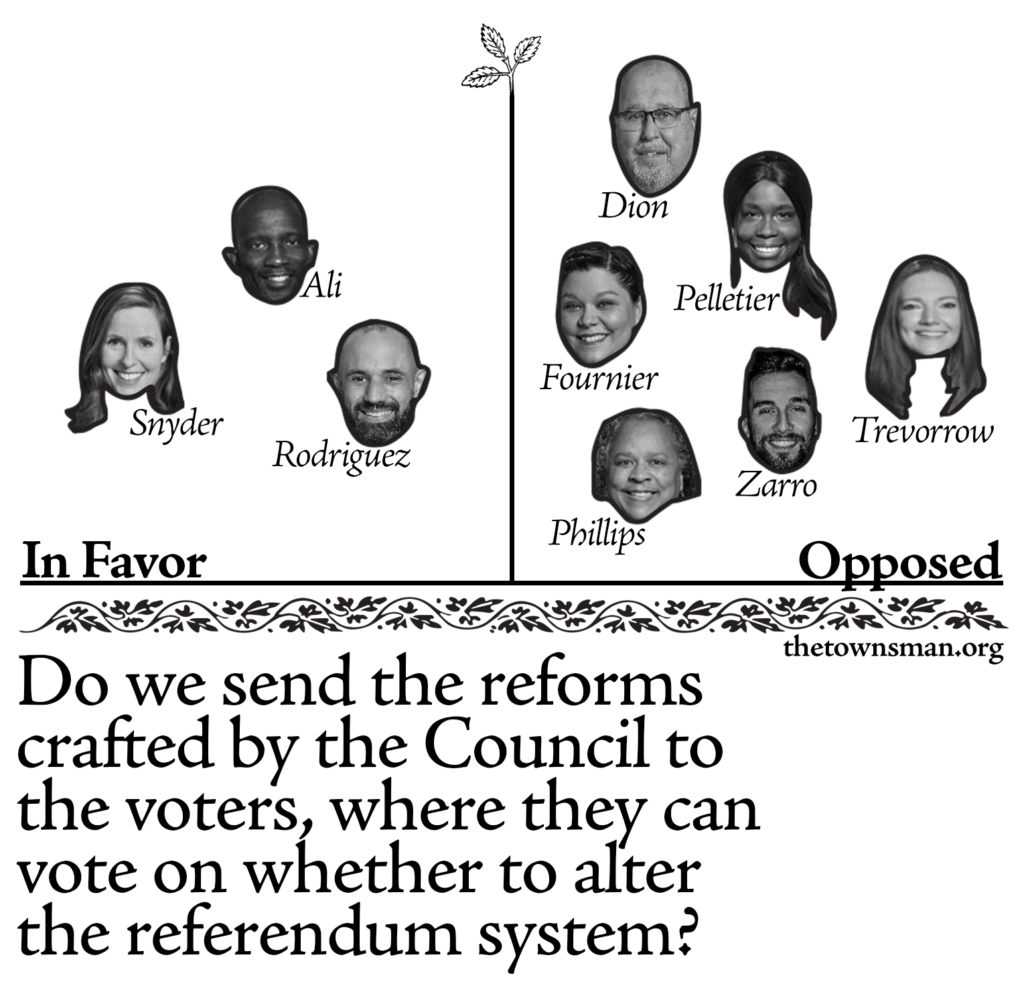
Citizen-initiated referenda are frequently focal points at council meetings. This order, which came to the Council late in the evening of July 17th, attempted to address some concerns about the referendum process through a package of reforms. The reforms would be added to the November ballot and ultimately voters would decide their fate. An outpouring of public comment against the changes left councilors unclear on the best path forward. Phillips proposed that the council postpone any action on the reform package. Snyder, Ali, and Rodriguez voted against Phillips’ suggestion, preferring to take some kind of action given all the deliberation that had already taken place on the subject. Other councilors supported the postponement. By a 6-3 vote, the council moved to postpone the matter.
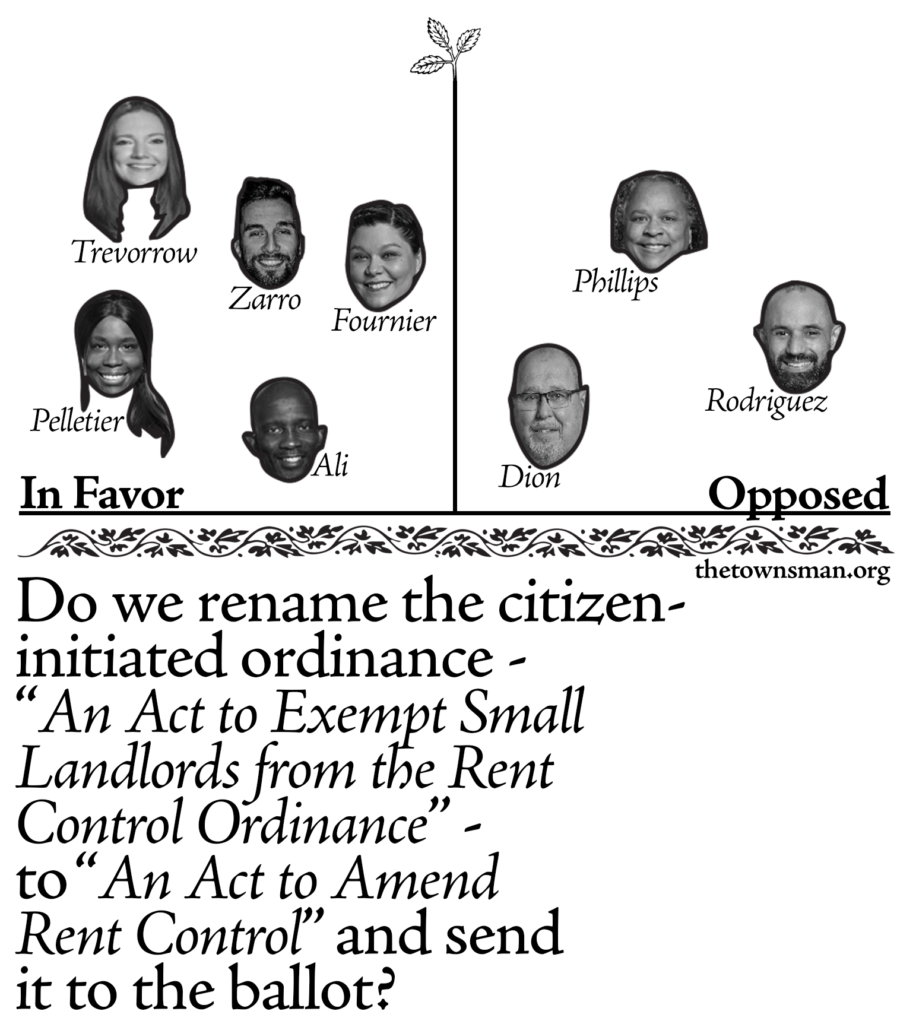
At the August 14th meeting, Councilors were asked to vote on a citizen-initiated referendum concerning rent control. Once again, the council has three options in this situation: add the referendum to the ballot; implement the referendum immediately; or, propose an additional, Council-sponsored option on the ballot. Following a precedent set at the March 20th meeting, Pelletier suggested that the council move to change the name of the referendum to make it more neutral. Originally named “An Act to Exempt Small Landlords from the Rent Control Ordinance”, the Council voted on the alternate title “An Act to Amend Rent Control.”
Those voting against the name change – Dion, Phillips, and Rodriguez – believed the new name provided less information to voters than the original one; it was also virtually the same referendum title that was on the June ballot, (“An Act to Amend Rent Control and Tenant Protections,”) despite that initiative being a different law. Those in favor of the name supported its neutral language.
The name change passed 5-3. During the vote to add the initiative to the ballot that followed, the Council was split 5-3 along the same lines.
Snyder was not present for this vote.
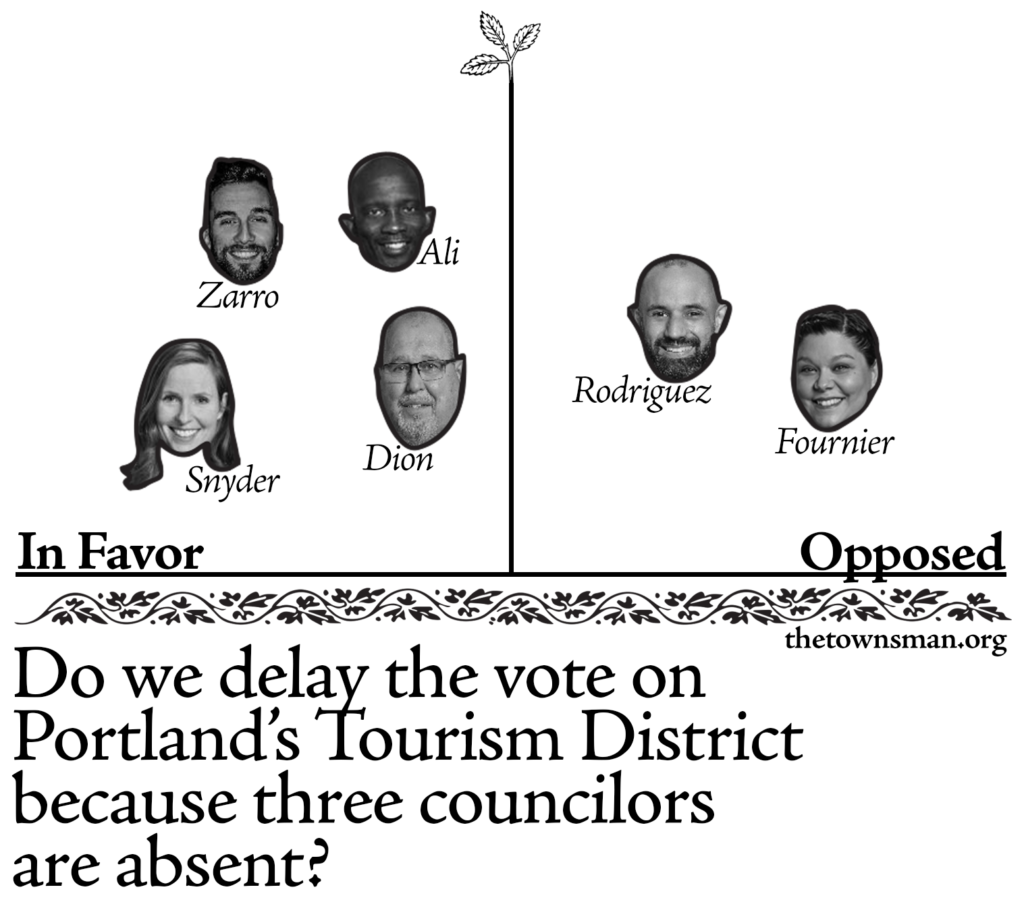
At the September 6th meeting, the City Councilors had three interrelated votes on the agenda concerning Portland’s Tourism Municipal Development District, sponsored by the Housing and Economic Development Committee. However, said committee’s chair, Ali, immediately moved to postpone the votes, citing the absence of three councilors – Trevorrow, Pelletier, and Phillips.
Rodriguez, however, felt as though the votes should move forward, as they still had a quorum. He also vaguely indicated that Ali was in some way manipulating the votes’ outcome by delaying it until the return of those three councilors. Moving to a vote, Fournier joined Rodriguez in voting against, but Dion, Snyder, Zarro, and Ali successfully voted to postpone.
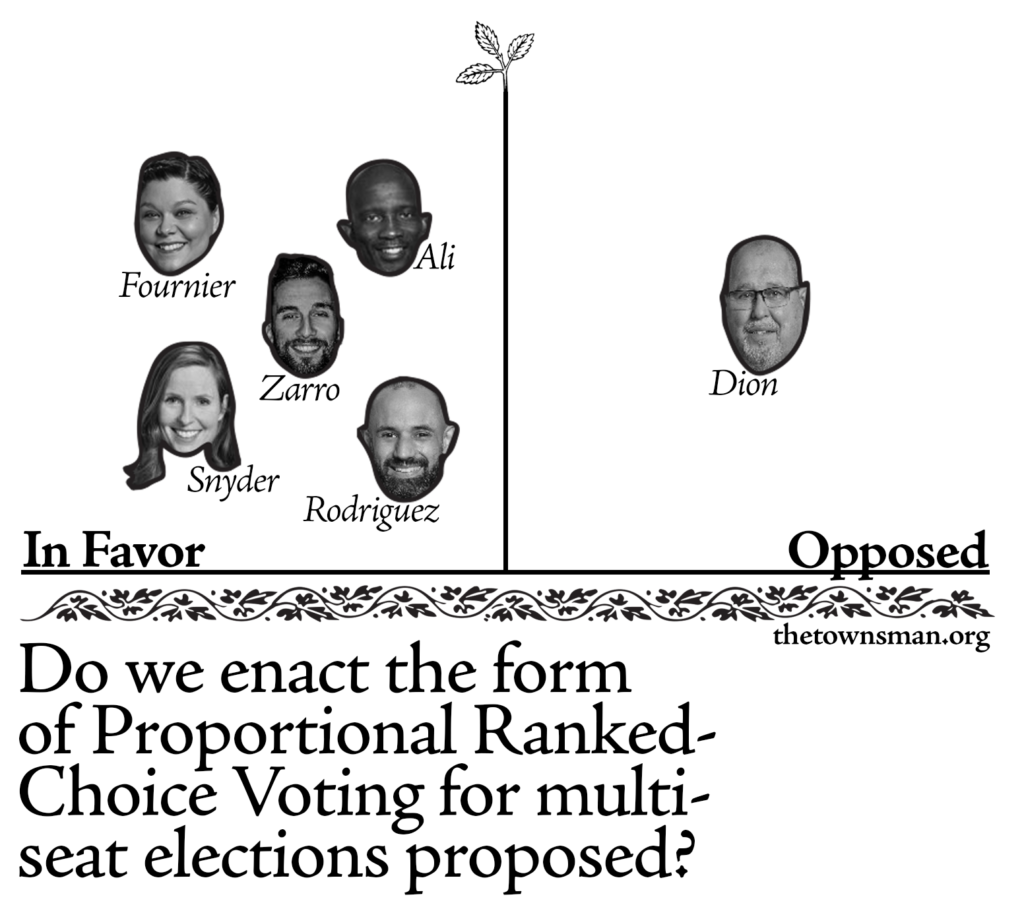
Also on September 6th, the City Council finally had the opportunity to enshrine another of the 2020 Charter Commission’s reforms into law: Proportional Ranked Choice Voting. Information about the details of Proportional Ranked Choice Voting for multi-seat elections can be perused here, but suffice to say that it is a new method of tabulating the winners of multi-seat elections where ranked-choice votes are used.
Dion asked Corporation Counsel Michael Goldman what would happen the council didn’t enact the proposed ordinance into law, to which he replied that it could be delayed but not killed. The City Council would be obligated to adhere to the decisions of the Charter Commission. Nevertheless, Dion voted against, though his reasons for doing so were not made explicit. All else present – Snyder, Zarro, Ali, Fournier, and Rodriguez – voted in favor.
The Townsman will be updating this page until the November election, check back soon!
Erica Snyder-Drummond – Erica is a proud Portland resident, documentary filmmaker, and baker. Previously she has been a campaign canvasser, an immigration advocate, and a server. You can see more of her work at www.ericajsd.com.


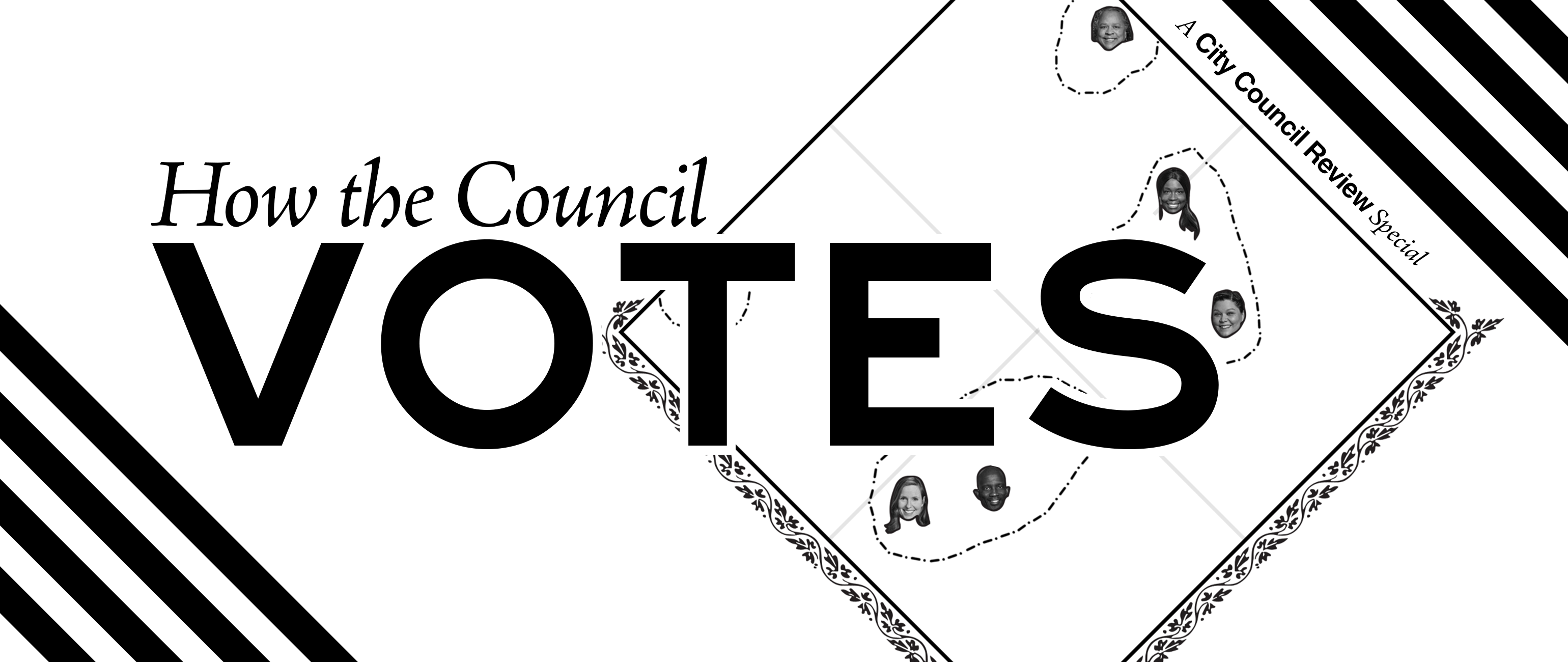
Fun analysis, thank you!
This is useful in many ways, and in some instances confirmed my suspicions and perspectives on how some councilors vote. I was impressed to see those individuals who maintained the courage of their convictions and voted for what they believed instead of with the herd. There are definitely patterns here,
and I really like what you are doing with this site.
This is very informative, a great service to our town. Thank you!